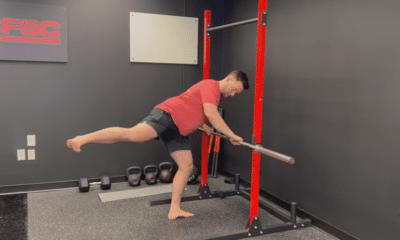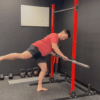Advantages And Disadvantages Of Ankle Weights
Ankle weights have gone in and out of fitness fashion, but at the moment, they’re solidly on-trend. More than a cute workout accessory, though, they’re a tool you can use strategically to engage and challenge your muscles in a way that other free weights just can’t do.
“Ankle weights can be used to enhance walking and is also as a great way to provide resistance for traditional leg and performance exercises,” says Lindy Royer, PT, NCPT, physical therapist, Balanced Body educator, and Pilates instructor. “Whether you’re looking to deepen the engagement of specific muscle groups or challenge your overall strength and stability, ankle weights can take your routine to the next level,” adds Bianca Melas, an Alo Moves Pilates instructor.
That said, ankle weights aren’t as harmless as they look. Using them incorrectly can even have some risks, Royer says. We tapped trainers to understand when and where ankle weights can come in handy, which pairs to buy, and how to put your cute new weights to good use—while minimizing any potential issues.
Benefits of ankle weights
Ankle weights can offer a variety of benefits when worn for your workouts or just walking around. “When used while walking, loading the leg with ankle weights has been shown to have cardiovascular, metabolic, neuromuscular, strength, proprioceptive, endurance, and balance benefits,” Royer says.
One small study published in Research in Sports Medicine, for example, found that a three-month program of walking with ankle weights improved fall-related fitness and bone metabolism (the process of bone breakdown and repair) in elderly women. Walking with weights can be especially helpful in maintaining or improving physical function in older adults, though it can even benefit walking ability in healthy adults.
Outside of walking, “using ankle weights for balance and resistive leg exercises or training drills can increase strength, power, and performance,” Royer says. Though they’re small, they really can help you build muscle. “It’s a simple yet effective piece of equipment that’s versatile, portable, and easy to add to any routine,” says Sotomethod trainer Katie Call. “The minute you strap them on, you’re increasing time under tension—the amount of time a muscle group is under strain or actively engaged. The added weight challenges your muscles and helps improve muscle endurance.”
Consider another study conducted in Malaysia that tasked two groups, each of about 40 adults, with engaging in different forms of resistance training: one participated in group exercise sessions three times per week using a pair of 2.2-pound dumbbells, while the other group wore 1.1-pound wrist and ankle weights during activities of daily living (think: housework or walking) for 20 minutes, three times per week.
After six months, the researchers found that both types of training resulted in significant improvements in waist circumference, waist-to-hip ratio, body fat percentage, and skeletal muscle percentage. Resistance training, in general, helps improve bone density (a key factor in the development of osteoporosis), so it’s likely using ankle weights can help do that as well, Royer says.
Adding resistance to your movements (whether they’re daily life activities or a workout) increases the overall demand on your body, making your workout more challenging—and that’s part of why adding ankle weights can have so many positive effects. For example, an interesting (albeit small) study published in Applied Sciences had 26 university students in Poland play physically active virtual reality games both with and without ankle weights. The researchers found that students’ heart rates were significantly higher when playing with ankle weights, suggesting they reached a higher exercise intensity and, thus, reaped more benefits from the session.
From a workout logistics standpoint, ankle weights also allow you to add hands-free resistance to bodyweight moves that may be otherwise tricky to level up. For example, they can make donkey kicks, side-lying series, or prone hamstring curls more challenging—all exercises that aren’t well-suited to using dumbbells. “Ankle weights are a game-changer for adding intensity to a Pilates workout,” Melas says. “I love using them in my classes, especially during flows that target the glutes, obliques, and inner thighs, or even strapping them to my wrists to engage the arms and postural muscles.”
Drawbacks of ankle weights
Many moves you’d do with dumbbells—squatting, deadlifting, rowing, pushing, and pressing—are moves that you might do with heavy objects in your daily life. It’s not so common or natural, however, to move around with weight attached to your ankles. That doesn’t mean you shouldn’t do it, but just that you should approach using ankle weights with caution since your body likely isn’t used to that type of stimulus.
“Incorrect use of ankle weights can have some risks—particularly when worn while walking,” Royer says. Using too much weight or walking more than tolerated can strain joints and connective tissues, exaggerate existing muscle imbalances, or place excessive strain on the back, hips, knees, or ankles, possibly creating pain or injury, she says. When starting an ankle weight walking program, it’s important to gradually increase weight, distance, speed, and time to build tolerance and avoid injury.
If you’re using ankle weights for non-walking workouts, there’s still a risk of compensating with improperform or engaging the wrong muscles, Call says. One pound may seem tiny, but when it’s on the end of your leg and you’re targeting a small muscle (like a hip abductor), it can pose a substantial challenge. This can happen when certain muscle groups (like the hip flexors or lower back) take over the movement instead of leaving the work to the primary muscles you’re trying to engage (like the core or glutes). “The beauty of ankle weights, though, is that you can easily remove them if you’re not feeling the right engagement,” she says.
How to use ankle weights
Ankle weights are particularly effective for workouts like Pilates, barre, sculpt, and dance sculpt, where the focus is on controlled movements, muscle activation, and endurance, Melas says. “I love using ankle weights for any sculpting movement, whether standing or on the mat,” Call adds. “I prefer adding ankle weights when I’m working with my smaller, endurance-focused muscle fibers—those that require sustained, low-intensity effort over longer periods of time.”
If you’re just starting to exercise with ankle weights, don’t tack them on to any old workout; instead, take classes that incorporate ankle weights or try moves specifically designed with ankle weights in mind. This way, you can see which moves are enhanced by the added weight while following the guidance of a trainer.
How heavy should you go? Melas recommends using light ankle weights, between 1 to 2 pounds. “They provide just the right amount of added resistance to boost your workout without compromising your form,” she says. “A common misconception is that heavier weights are always better, but going too heavy can lead to poor alignment, potentially reducing the effectiveness of the exercise and increasing the risk of injury. Using the right weight allows you to engage and target the correct muscles more effectively.”
If you’re going to use ankle weights for walking, the recommended weight is 1 to 2 percent of the user’s body weight, Royer adds. “Start with the lowest weight and increase in small increments to the desired weight,” she says.
Safety tips
1. Get comfortable with bodyweight moves first
You wouldn’t squat a barbell without mastering a bodyweight squat first, and the same should be true for any moves using ankle weights. “When using ankle weights for resistance exercises, the mistake many people make is to add ankle weights before they can perform the exercise with good form, control, and range of motion,” Royer says. “This mistake can lead to strains and injury.”
2. Start light
Royer, Melas, and Call all agree: You should start as light as possible and work your way up to heavier weights. For this reason, it’s a good idea to go for adjustable ankle weights that will allow you to slowly increase the challenge.
“As your strength and endurance gradually improve, you can begin to increase the weight,” Melas says. “The key is to challenge your muscles without compromising form—this will ensure you’re getting the most benefit from your workout while reducing the risk of injury.” And don’t be fooled by the small numbers. “I’m always surprised by how much of a difference a 1-pound ankle weight can make,” Call says.
3. Don’t cheat
It’s crucial to focus on maintaining good form when you start adding ankle weights to exercises. “If you notice another muscle taking over during movements, it’s a sign that you may be overloading your body,” Melas says. “This is a common issue, and we’ve all been there. In these cases, it’s best to remove the ankle weights, reassess your alignment, and bring your focus back to the targeted muscle.”
Likewise, avoid using momentum to get the moves done. Instead, move the leg with control through the full range of motion, Royer says.
Best ankle weights to shop
1. Bala Bangles Ankle Weights — $65.00
You’ve no doubt seen Bala Bangles on your Instagram feed—and the hype is real. “They’re such a stylish and practical choice,” Melas says. “Not only do they come in a beautiful range of colors, but they’re also super secure during your workout, so you don’t have to worry about them slipping or shifting. I love how they add a chic vibe to any workout, making it feel like a little luxury while you train.” They’re 1 pound each, which is a solid starter weight for those new to ankle weight training.
2. Sportneer Adjustable Ankle Weights — $31.00
If you’re looking for an adjustable ankle weight, try these ones recommended by Royer. “I like any good quality ankle weights with an adjustable component so the user can increase or decrease the weight,” she says. “These Sportneer weights are a practical, affordable option and I like that they start at 1 pound. That’s often enough for a new user.”
3. Pvolve Ankle Weights — $30.00
These soft, neoprene ankle weights from Pvolve come in 1.5 pounds, which could be a good choice if you find that 1-pound weights aren’t enough to challenge you anymore. Reviewers say they’re comfortable and secure, don’t rub around the ankles, and that the weight is distributed nicely thanks to the sand inside.
















